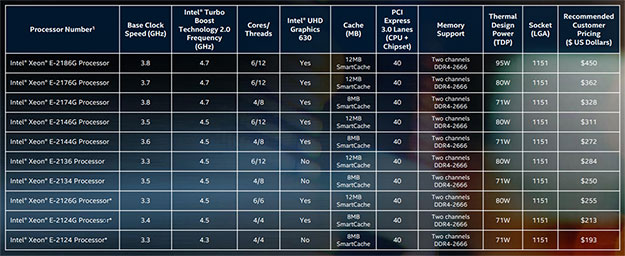Intel Unveils Beast Cascade Lake-AP 48-Core Xeon With 12-Channel DDR4, Xeon E-2100 Coffee Lake CPUs Ship
The Xeon E-2100 Series is based on Intel’s 14nm++ Coffee Lake architecture, and uses the LGA-1151 socket. All processors support dual-channel DDR4-2666 memory and feature a TDP ranging from 71 watts up to 95 watts for the flagship. 40 PCI Express 3.0 lanes are supported across the processor family (CPU + chipset), while either 8MB or 12MB of SmartCache is available (depending on the SKU). All of the processors currently support up to 64GB of RAM, but support for 128GB will be added with a BIOS update in Q1 2019.
The base Xeon E-2124 processor ($193) is a quad-core part with HyperThreading disabled (four threads), 8GB of SmartCache, no integrated GPU, a base clock of 3.3GHz and an Intel Turbo Boost 2.0 frequency of 4.3GHz. The flagship Xeon E-2186G ($450) is a hexa-core processor with HyperThreading enabled (12 threads), 12MB SmartCache, Intel UHD Graphics 630, a base clock of 3.8GHz and a Turbo Boost 2.0 clock of 4.7GHz.
The bigger news from Intel comes in the form of the upcoming 14nm++ Cascade Lake Xeon processors. As recently as this past August, Intel said that its Cascade Lake-SP processors would be available during Q4 2018. However, Intel announced today that it will also be launching even higher performing Cascade Lake-AP processors during the first half of 2019. Intel says that these processors will be powerhouses compared to the current Xeon Scalable family and even AMD’s mighty EPYC 7601.
According to Intel, its 48-core Cascade Lake-AP Xeons are projected to offer a 3.4x uplift in Linpack and a 1.3x uplift in Stream Triad versus the EPYC 7601. Compared to the Xeon Scalable 8180, the performance delta is 1.21x and 1.83x respectively. In addition, Intel claims that its AI/Deep Learning Inference offers up to a 17x improvement in images-per-second compared to Xeon Platinum processors.
In its most potent form, Cascade Lake-AP will be available in two-socket server configurations with up to two 48-core Xeon processors. The processors will have access to 12-channel DDR4 memory (per socket) for unprecedented memory bandwidth in its class.
While all of this sounds promising, we have to also keep in mind that AMD has scheduled a “Next Horizon” event for this Tuesday in which it "will discuss innovation of AMD products and technologies, specifically designed for the datacenter on industry-leading 7-nanometer process technology." In other words, the company will be talking about its upcoming 7nm Zen 2 “Rome” based EPYC server processors, which are said to provide on average a 13 percent IPC uplift compared to current 12nm Zen+ processors. With up to 64 physical cores expected to be available at launch, Cascade Lake will be up against some incredibly stiff competition in 2019.




